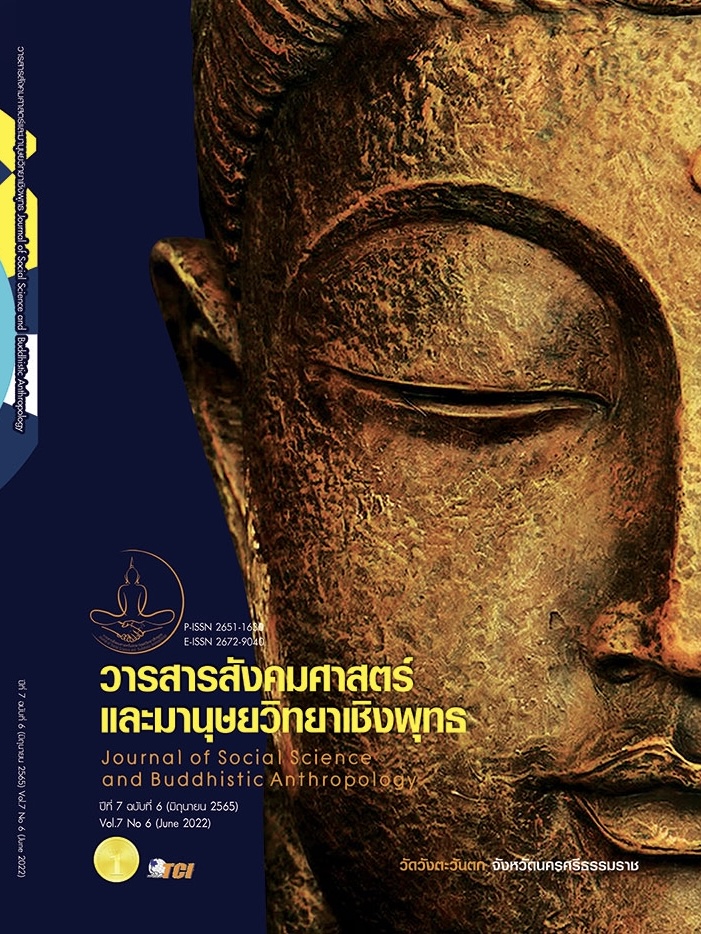A TRAINING PROGRAM DEVELOPMENT TO ENHANCE GUIDE SCOUTS’ CULTURAL TOURISM ENGLISH LISTENING AND SPEAKING SKILLS BASED ON CONTEXT-BASED LEARNING, COLLABORATIVE LEARNING AND SCAFFOLDING
Keywords:
Training Program , Context-Based Learning, Collaborative Learning, ScaffoldingAbstract
The objectives of this research article were to 1)develop a training program to enhance guide scouts’ cultural tourism English listening and speaking skills based on context-based learning, collaborative learning and scaffolding, 2) to investigate the effects of implementing the developed training program the Research is Research and Development in 3 stages including background information of 118 participants, program design and development, and program implementation. The volunteer participants were 30 primary 4 and 5 students from Uthenwithayakarn School. The research tools included a developed training program, an English listening and speaking test, a cultural awareness assessment form, and a satisfaction questionnaire. The statistical data analysis consisted of percentage, mean, standard deviation, and t-test for dependent samples. The findings demonstrated that 1) eight elements of the developed training program contained rationale and significance, basic concepts, principles, objectives, program structure, activity guidelines,learning materials and resources, and measurement and evaluation. 2) The effects of implementing the developed training revealed that: the participants’ English listening and speaking post-test scores were higher than prior to the intervention with a statistical significance at the .01 level. Their cultural awareness was found at a high level ( = 4.25, S.D.=.82) and their satisfaction toward the developed training was found at a high level (
= 4.09, S.D.=.55).
References
กาญจนา แสงลิ้มสุวรรณ และคณะ. (2560). ท่องเที่ยวเชิงมรดกวัฒนธรรมอย่างยั่งยืน. วารสารนักบริหาร, 32(4), 139-146.
จุฑาทิพย์ สุทธิเทพ. (2559). การพัฒนายุวมัคคุเทศก์เพื่อส่งเสริมการท่องเที่ยวท้องถิ่นของเยาวชนตำบลมะเกลือใหม่ อำเภอสูงเนิน จังหวัดนครราชสีมา. ใน โปรแกรมวิชาอุตสาหกรรมท่องเที่ยวและธุรกิจบริการ สาขาการจัดการธุรกิจการค้าสมัยใหม่. มหาวิทยาลัยราชภัฏนครราชสีมา.
ธนชาติ หล่อนกลาง. (2552). การพัฒนารูปแบบการเรียนการสอนวัฒนธรรมท้องถิ่นตามแนวการสอนประสบการณ์ การอ่านแบบเสริมต่อการเรียนรู้เพื่อเสริมสร้างความสามารถ การอ่านภาษาอังกฤษเพื่อความเข้าใจและเจตคติต่อวัฒนธรรมท้องถิ่น ของนักศึกษามหาวิทยาลัยราชภัฏ. ใน ดุษฎีนิพนธ์ครุศาสตรดุษฎีบัณฑิต สาขาเทคโนโลยีและสื่อสารการศึกษา. จุฬาลงกรณ์มหาวิทยาลัย.
พระวิชชญะ น้ำใจดี. (2561). การมีส่วนร่วมของชุมชนในนโยบายการจัดการแหล่งท่องเที่ยวเชิงวัฒนธรรม: กรณีศึกษาบ้านเชียงจังหวัดอุดรธานี. วารสารวิทยาลัยสงฆ์นครลำปาง, 7(2), 283-294.
พลวัต วุฒิประจักษ์. (2553). การพัฒนาหลักสูตรรายวิชาจิตตปัญญาศึกษา สำหรับนักศึกษาครู เพื่อเสริมสร้างคุณลักษณะบัณฑิตครูที่พึงประสงค์. กรุงเทพมหานคร: มหาวิทยาลัยศิลปากร.
วิจิตรา วงศ์อนุสิทธิ์. (2561). การพัฒนาชุดฝึกการพูดและการอ่านภาษาอังกฤษเกี่ยวกับแหล่งท่องเที่ยว ในจังหวัดสกลนคร. วารสารวิชาการหลักสูตรและการสอน, 10(27), 217-225.
สำนักงานจังหวัดนครพนม. (2561). สรุปความก้าวหน้าเศรษฐกิจพิเศษนครพนม. นครพนม: สำนักงานจังหวัดนครพนม.
อัครพนธ์ เนื้อไม้หอม. (2558). ศึกษาและพัฒนานวัตกรรมการสื่อสารภาษาอังกฤษเพื่อการท่องเที่ยว สำหรับบุคลากรด้านการท่องเที่ยว ที่ปราสาทพนมรุ้ง อำเภอเฉลิมพระเกียรติ จังหวัดบุรีรัมย์ (รายงาน ผลการวิจัย). บุรีรัมย์: มหาวิทยาลัยราชภัฏบุรีรัมย์.
Akers B. A. (1999). Introducing Better English Pronunciation. Cambridge University Press: Sense Publishers.
Barry J. Fraser & David B. Z. (2016). Teachers Creating Context-Based Learning Environments in Science. The Netherlands: Sense Publishers.
Downloads
Published
How to Cite
Issue
Section
License
Copyright (c) 2022 Journal of Social Science and Buddhistic Anthropology

This work is licensed under a Creative Commons Attribution-NonCommercial-NoDerivatives 4.0 International License.









